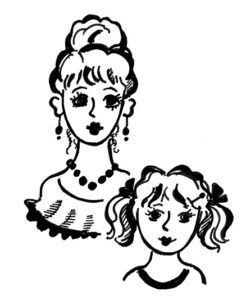1
The Nominative Case
Gender of Nouns
© activerussian.com

Russian grammar starts with a little surprise – all beings, objects, and names belong to one of the three genders: masculine, feminine, and neuter. But don’t worry: luckily, they are almost always eager to show their gender by the last letter:
| m. он | f. она́ | n. оно́ |
| cons. | -А / -Я | -О / -Е |
| телефо́н Милан | му́зыка Росси́я | метро́ кафе́ |

However, there are a few words that end with a soft sign -Ь, they can be masculine or feminine, and these are the ones you should learn with their gender.
| он | она́ |
| – Ь | |
| рубль оте́ль день | любо́вь дочь ночь |

| он | оно́ |
| мужчи́на па́па де́душка дя́дя ко́фе (m, n) | вре́мя и́мя |


Be careful with informal men’s names: they often have feminine endings -А / -Я, but they are still masculine as they refer to men.
 | |
| он | |
| Алекса́ндр – Са́ша | Константи́н – Ко́стя |
| Алексе́й – Лёша | Дми́трий – Ди́ма |
| Серге́й – Серёжа | Влади́мир – Воло́дя / Во́ва |
| Ива́н – Ва́ня | Вячесла́в – Сла́ва |
| Никола́й – Ко́ля | Рома́н – Ро́ма |
| Пётр – Пе́тя | Ви́ктор – Ви́тя |
 |
| она́ |
| Мари́я – Ма́ша |
| Екатери́на – Ка́тя |
| Светла́на – Све́та |
| О́льга – О́ля |
| Ната́лья – Ната́ша |
| Да́рья – Да́ша |
